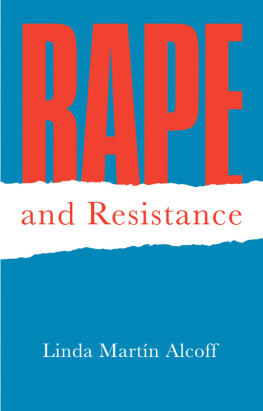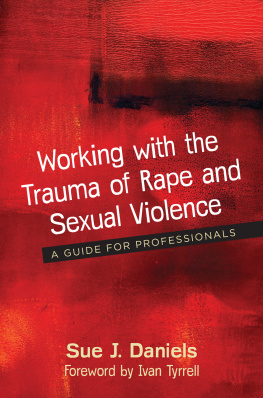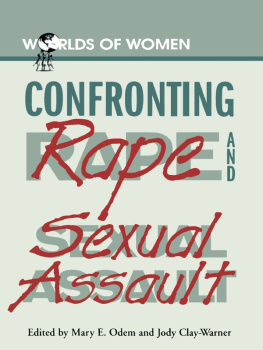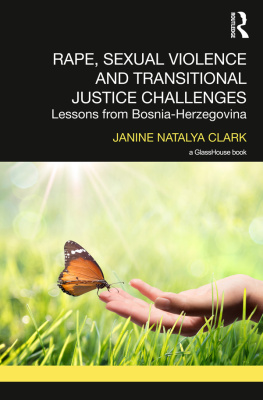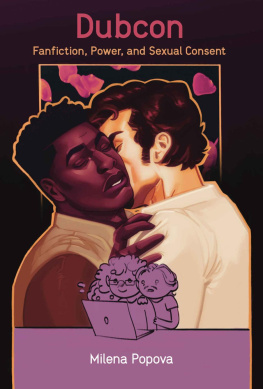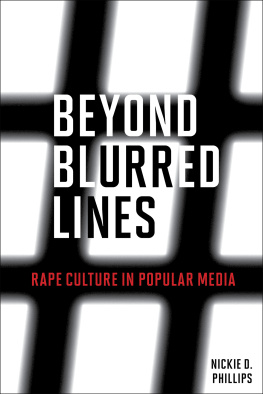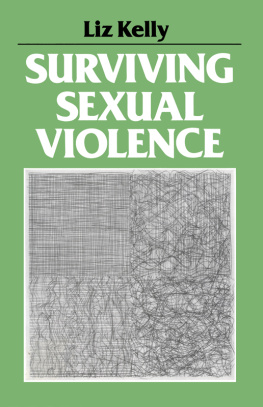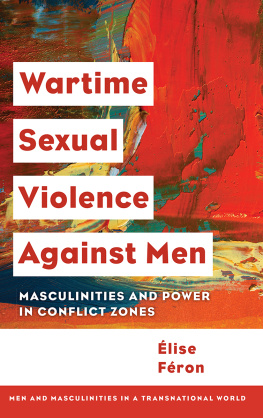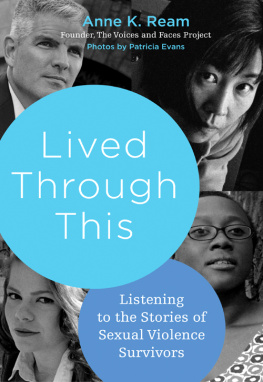
Dedication
to those who know
Copyright page
Copyright Linda Martn Alcoff 2018
The right of Linda Martn Alcoff to be identified as Author of this Work has been asserted in accordance with the UK Copyright, Designs and Patents Act 1988.
First published in 2018 by Polity Press
Polity Press
65 Bridge Street
Cambridge CB2 1UR, UK
Polity Press
101 Station Landing
Suite 300
Medford, MA 02155, USA
All rights reserved. Except for the quotation of short passages for the purpose of criticism and review, no part of this publication may be reproduced, stored in a retrieval system or transmitted, in any form or by any means, electronic, mechanical, photocopying, recording or otherwise, without the prior permission of the publisher.
ISBN-13: 978-0-7456-9191-6
ISBN-13: 978-0-7456-9192-3 (pb)
A catalogue record for this book is available from the British Library.
Typeset in 11.25 on 13 pt Dante by Toppan Best-set Premedia Limited
Printed and bound in Great Britain by CPI Group (UK) Ltd, Croydon
The publisher has used its best endeavours to ensure that the URLs for external websites referred to in this book are correct and active at the time of going to press. However, the publisher has no responsibility for the websites and can make no guarantee that a site will remain live or that the content is or will remain appropriate.
Every effort has been made to trace all copyright holders, but if any have been inadvertently overlooked the publisher will be pleased to include any necessary credits in any subsequent reprint or edition.
For further information on Polity, visit our website: politybooks.com
Acknowledgments
I have been fortunate to participate in numerous support groups for survivors over the years, in Providence, Kalamazoo, and Syracuse. Some of these were organized formally by social service organizations and some simply by activists. Here I was able to witness as well as take part in the collective and tentative process of developing an understanding. The memories of our many conversations have stayed with me for years. I have given portions of the arguments of this book at numerous conferences, colleges, and universities, in several countries around the world, always with private conversations afterward with members of the audience. I want to express my thanks to all of those who have shared their stories and their analyses with me.
I have also discussed these topics with numerous colleagues and friends over the years to my great benefit, including especially Ann Cahill, Laura Gray-Rosendale, Raja Halwani, Jamie Lindsay, Ingeborg Majer-OSickey, Sarah Clark Miller, Robert Praeger, and Steven Seidman.
Finally, I owe a special debt to the following people: to my family for their million acts of support and kindness; to Laura Gray-Rosendale for venturing to collaborate on this difficult topic with me many years ago; and to Amber Chiacchieri for working incredibly hard as my research assistant and also giving me sound feedback on many theoretical points. I want to also thank Sarah Gokhale for preparing the excellent index, and Sam Alcoff and Anna Gold for their helpful ideas for the cover design.
Text Acknowledgments
, Speaking as, appeared, co-authored with Laura Gray (now Laura Gray-Rosendale), as Survivor Discourse: Transgression or Recuperation? Copyright SIGNS. This article first appeared in SIGNS Volume 18, Issue 2 (Winter 1993), pages 26090.
Introduction: Rape after Foucault
We are living in a moment of an unprecedented global social revolution. It has been instigated by the many survivors of sexual violence who have come forward, forcing the issue into the public domain with an unparalleled visibility. Across the world, the multiple voices of victims are growing in strength, and taking courage from each other's success. In some cases, their words have brought down powerful men and put revered institutions religious, military, media, government, entertainment on the defensive. Just as important as their voices are the many others who are fighting to ensure that survivors voices are heard, and heard fairly.
Yet, despite the wider and better media coverage, there is also a continuation of the long practice of casting accusers as hysterical liars, or blaming them for their violation, or bullying them into silence or even suicide. Old tropes of revenge, jealousy, and the innate deceitfulness of women are persistently used to discredit accusers, as well as the idea that victims exaggerate their suffering in order to gain some kind of status. Social media has shown itself to be a rather sharp double-edged sword: a tool for whistle blowers but also an easy means to stage a virtual stoning of victims.
The atmosphere around sexual violence can appear to resemble a team sport with clearly demarcated sides, and no space in the middle. Advocates and activists can get caught up in the need to hammer home the message that we have an epidemic and all accusers must be believed. They rightfully point out how this issue still generates an unfathomable shrug of the shoulders: Why should his life be ruined by just 20 minutes of action? as one enraged father of an accused Stanford University student put it. One of the confounding aspects of rape is the way in which many people around the world persist in repudiating the significance of the harm and misplacing the blame.
This book is not written from the middle of this agonistic struggle: I am an advocate, have been an activist, and am a survivor myself. I argue, however, that the movement itself need not fear exploring either a more complex understanding of the constitution of the experience of sexual violence or the sometimes complicated nature of culpability. Well beyond the arena of legal reform, there is understandable uncertainty about how expansively to define sexual coercion, how overtly to demand consent, how seriously to interpret repressed memories, how strictly to constrain the freedom of past offenders, even how to think about the sexuality and sexual desires of children and young people.
It is often the voices of victims who bring us these difficult questions, and thus, I will argue, it is the voices of victims that need to remain at the center of the fight for cultural change. It is their/our knowledge that is at stake when the problem is shrugged away, but this knowledge must be heeded to enlarge, enrich, and also complicate our understanding of the problem. Hence what we need is a new epistemology of rape, which is to say we need a new understanding of the way in which our collective knowledge of the problem has been formed, and might be improved.
It was not until I began an earnest study of the work of the French philosopher Michel Foucault that I thought about sexual violence within a theoretical framework. Foucault's specific statements on rape were problematic, to say the least, and have been the subject of deserved feminist critique (Plaza . Although he wrote extensively about the history of sexuality, Foucault did not contribute new ideas about the cause of sexual violence, a topic that is still in the first throes of serious academic research and debate. But in any case, I was, and am, more interested in a solution. And here Foucault has some interesting contributions to make.
Foucault's work offers a diagnosis of the politics of speech and authorization in relation to subject-position and social identity (Foucault 1972; Alcoff 1996; Hacking 2002). He defined discourses as the background system that organizes our knowledge and the practices that relate to knowledge. He argued that discourse is an important site of social struggle, given that discourses organize the realm of intelligible meanings and the range of meaningful questions and statements. He also showed how there must be excluded speech, derogated, unspoken, in order to maintain existing discursive systems in place. Foucault's idea of a discourse was that it was less about what is said than about the prior conditions of the statable. The concept of homosexuality as we use it today had no referent in ancient Greece, despite the fact that the activities we associate with it were plentiful. It is not quite as simple as saying the identity existed though it lacked a term: Foucault and others plausibly suggest that identity formations and even the texture of experiences can be affected by the available concepts that delimit the scope of the intelligible. Thus, the borders of meaningfulness are not determined in any simple and straightforward way by the actual conditions of practice or by common events. In other words, concepts and terms and statements do not emerge as they do determined by the social and natural worlds, but are somehow partially independent, and sometimes effectively constitutive, of those worlds. The language itself is part of the practice, part of what makes it possible, part of what makes it meaningful, part of what gives people ideas of what they can do and of what they have just experienced.
Next page
